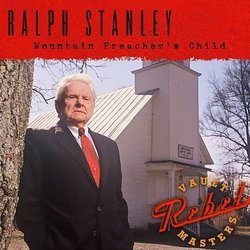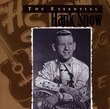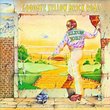| All Artists: Ralph Stanley Title: Mountain Preacher's Child Members Wishing: 1 Total Copies: 0 Label: Rebel Records Original Release Date: 1/1/2006 Re-Release Date: 4/3/2007 Genres: Country, Folk, Pop, Christian & Gospel, Gospel Styles: Bluegrass, Classic Country, Southern, Country & Bluegrass Number of Discs: 1 SwapaCD Credits: 1 UPC: 032511751720 |
Search - Ralph Stanley :: Mountain Preacher's Child
 | Ralph Stanley Mountain Preacher's Child Genres: Country, Folk, Pop, Christian & Gospel, Gospel
Mountain Preacher's Child features tracks from Ralph Stanley's magnificent but often overlooked Gospel recordings of the early 1980s. The material included here--all of it available on CD for the first time--comes from ... more » |
Larger Image |
CD DetailsSynopsis
Album Description Mountain Preacher's Child features tracks from Ralph Stanley's magnificent but often overlooked Gospel recordings of the early 1980s. The material included here--all of it available on CD for the first time--comes from three albums: I'll Wear A White Robe (1979), Snow Covered Mound (1982) and I Can Tell You The Time (1985) (the lone exception, "Looking for the Stone," appeared on the 1975 release Let Me Rest on a Peaceful Mountain featuring Keith Whitley). Stanley's group of Clinch Mountain Boys during this period of the late `70s and early `80s was arguably his best lineup. The band on most of this collection--Charlie Sizemore (rhythm guitar, lead and harmony vocals), Junior Blankenship (lead guitar), Curly Ray Cline (fiddle), Jack Cooke (bass and harmony vocals) and Ralph Stanley (banjo, lead and harmony vocals)--remained together for over nine years, the longest Stanley ever went without a personnel change. No doubt, this longevity and stability contributed to the group's hard driving, cohesive sound, and, with Stanley in his prime, it resulted in some of the best music of his career. Similarly Requested CDs
|
CD ReviewsReverent, uplifting (& occasionally cautionary) messages sim J. Ross | Roseburg, OR USA | 05/02/2007 (4 out of 5 stars) "Playing Time - 36:06 -- At track eight on this disc, Ralph Stanley and the Clinch Mountain Boys exclaim "give me that old time religion, that's for me!" Ralph Stanley once stated he felt a little like a preacher when performing gospel music -- "You have a different feeling in the gospel. I can put more in a sacred song than I can just an ordinary song. I can feel more. I feel like I'm doing myself, and maybe other people too, more good." That is the emotional resonance and musical ministry imparted on this album, a compilation of 14 bluegrass gospel songs drawn from three of Ralph Stanley's LPs previously released by Rebel Records. The three albums are I'll Wear A White Robe (1979), Snow Covered Mound (1982), and I Can Tell You The Time (1985). There are six, five, and two songs from those records, respectively. Perhaps a few more songs from the later albums, like "Harbor of Love," would have made this compilation even sturdier. The rhythmically and vocally strong closing track of "Looking for the Stone" was taken from a 1975 album called Let Me Rest on a Peaceful Mountain.
With the exception of that last track, the mountainous band includes Ralph Stanley (banjo, vocals), Charlie Sizemore (guitar, vocals), Junior Blankenship (lead guitar), Curly Ray Cline (fiddle), and Jack Cooke (bass, vocals), a configuration that was together from 1978-86. The closing number (from 1975) has Keith Whitley and Ricky Lee instead of Sizemore and Blankenship. "Snow Covered Mound" is the only a cappella quartet with guest Chester "Pop" Marshall singing bass. There are three a cappella trios, six accompanied trios, and four duets sung together by Stanley and Sizemore. The a cappella trio does a particularly fine job on one of my favorites, the title cut from "I'll Wear A White Robe" led vocally by Stanley. Sizemore had only been with the band since late-1977, and he was filling big shoes that had been worn by singers Larry Sparks, Roy Lee Centers and Keith Whitley. Charlie, only 16 when he went to work for Ralph, felt the pressure. He had a style of his own, and his smooth vocalizing, especially from the 1979 album, lacked some of the powerful hard edge to blend equitably with Ralph`s in a duet like "Walking Up This Hill On Decoration Day" and "Oak Grove Church." Perhaps the blend was also a function of Charlie's vocal projection, the songs' keys, and/or how they were recorded. "I'm in a New World" is the type of number that could have really been imparted with more energy and enthusiasm, but it comes across with some tentativeness and uncertainty. A determined overachiever, Sizemore definitely gained confidence, grew in the role, and learned from singing with the master. He is more comfortable and soulful on numbers like "Troublesome Waters" and "The Man in the Middle" from the later 1982 and 1985 LPs. By then, Sizemore had learned to phrase better with Ralph, and the result is that the later recorded songs exude even more conviction and believability than the earlier material. While each person can relate to some of the unpretentious songs better than others, the messages are poignant and everlasting. Lyrically, the songs encourage us to think about the meaning of the words. Melodically, the pieces are provocatively simple. Instrumentally, there is Ralph's solid driving banjo, and I always enjoy hearing Cline's rustic fiddling and Blankenship's lead guitar work (e.g. "Oak Grove Church"). Pop Marshall contributes flavorful harmonica on "The God That Never Fails," written by David Marshall. Conceptually, "Mountain Preacher's Child" has competent, joyful music that is strong and durable. Mountain Preacher's Child reinforces the status of Dr. Ralph Stanley as a legend. I certainly appreciate the band's emphasis on powerful yet plaintive singing in fairly complicated vocal arrangements. But, perhaps even more than that, their reverent, uplifting (and occasionally cautionary) messages simply make us feel good. (Joe Ross, staff writer, Bluegrass Now) " |

 Track Listings (14) - Disc #1
Track Listings (14) - Disc #1




![Perennial Favorites [ENHANCED CD]](https://nationalbookswap.com/cd//m/10/6810/366810.jpg)



